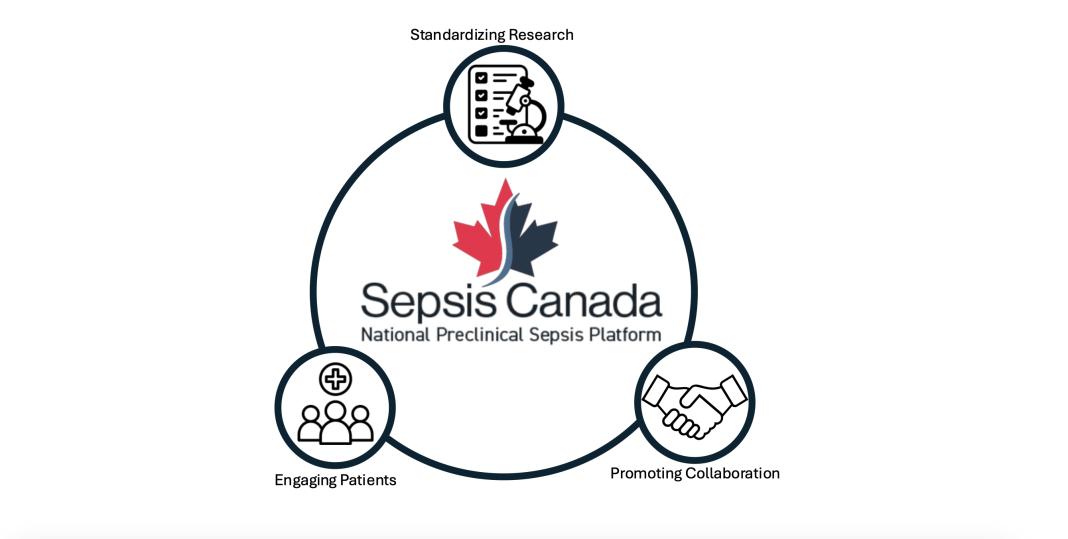Sepsis represents a significant global burden. The National Preclinical Sepsis Platform (NPSP) is leading vital sepsis research, informing policy, driving innovation, and ultimately saving lives
Sepsis is a devastating condition triggered by the body’s extreme response to an infection. Patients with sepsis are often admitted to an intensive care unit (ICU), where they are given a barrage of life-saving treatments to combat the infection and restore basic organ functions like breathing and circulation.
Despite our medical advancements, mortality rates for sepsis remain unacceptably high, with 30-50% of patients dying from this condition. In Canada, sepsis accounts for one in every 18 deaths and imposes a staggering $1.7bn burden on the healthcare system each year.
Preclinical research, conducted in labs with cells and animal models, is crucial to advancing our understanding of sepsis and developing novel treatments. Recognizing the need for innovative approaches to study sepsis in the lab, the National Preclinical Sepsis Platform (NPSP) was formed by Sepsis Canada. The NPSP has established a network of basic-scientist and patient partnerships across Canada to strike a bold new direction for preclinical sepsis research. Our collaborative initiative aims to standardize preclinical methodologies, accelerate novel therapeutics, and actively involve patients in a research environment that is often beyond their reach.
STRONGER – creating a standardized model for sepsis research
Preclinical sepsis research depends on animal models to study the complexity of the condition that impacts every organ system. Ensuring this research is reliable and reproducible isn’t just a scientific goal – it’s an ethical obligation. Our standardized sepsis model is a critical step towards more consistent and impactful results.
A critical need in all preclinical research, including sepsis research, is the ability to replicate findings across different studies and laboratories. The inability to replicate research findings is surprisingly common and can hinder scientific advancement, erode public trust, and lead to the misallocation of resources. To address this, the NPSP is developing a standardized and reproducible lab animal model of sepsis. This model aims to enhance the reliability of research findings, reduce the number of animals needed, and facilitate the translation of results into actionable interventions for sepsis patients. Overcoming the challenges associated with developing this model, such as variability in animal responses and ensuring the model accurately mimics key features of human sepsis, is a crucial step towards improving the quality and reproducibility of preclinical sepsis research. We believe this model will not only elevate preclinical sepsis research but also accelerate the development of more effective treatments, ultimately bringing us closer to improving patient outcomes.
FASTER – pioneering multi- laboratory collaboration in preclinical research
Speed is critical in the race to understand and treat sepsis. We are uniting preclinical laboratories to accelerate the pace of discovery.
By uniting six Canadian laboratories, the NPSP is pioneering Canada’s first multi-laboratory preclinical research study. While such efforts are common in multicenter clinical studies – where standardized protocols across hospitals helps recruit participants quickly and test generalizability across diverse settings – they have been rare in preclinical research. Our approach sets a new standard by conducting experiments that would take a single lab years to complete. This collaborative effort leverages the expertise and resources of each participating institution to accelerate research and ensure the generalizability of findings. This not only speeds up scientific discovery but also strengthens the reliability and impact of research outcomes, establishing a new benchmark for preclinical studies.
MORE – integrating patient voices: A new era in preclinical sepsis research
Patients are the ultimate end-users of all biomedical research. By integrating their perspectives and needs, we ensure our research is relevant and impactful.
The NPSP is pioneering patient engagement in preclinical sepsis research, where those with lived experience of the condition contribute as active research team members. This approach, now a standard in clinical research, has significantly improved research outcomes. However, in preclinical research, patient engagement remains both novel and under-utilized despite its potential to reshape preclinical research priorities. The NPSP is addressing this by integrating a patient panel into our research team. The patient panel has attended our research group meetings, contributed to discussions, and directly influenced our research direction and outcomes. This collaboration has been mutually beneficial – providing patients with unprecedented access to research and offering preclinical researchers a deeper understanding of the condition they study. By making patient engagement a cornerstone of the NPSP, we aim to set a new standard for preclinical research, aligning our research with the needs and perspectives of those directly affected by sepsis.
The NPSP’s work represents a critical advancement in Canada’s approach to sepsis, addressing a pressing public health challenge through innovation and collaboration. By standardizing preclinical models, promoting multi-laboratory collaboration, and actively involving patients in the research process, we are creating a more reliable and responsive foundation for future sepsis research. These efforts will enhance our understanding of sepsis, accelerate the development of new therapies, and enhance our preparedness for emerging infectious threats. As we move forward, the NPSP will continue to build on these principles, strengthening our healthcare system’s resilience and ensuring Canada plays a key role in global efforts to improve patient outcomes. Through this integrated approach, we aim to inform policy, drive innovation, and ultimately save lives.

This work is licensed under Creative Commons Attribution-NonCommercial-NoDerivatives 4.0 International.


